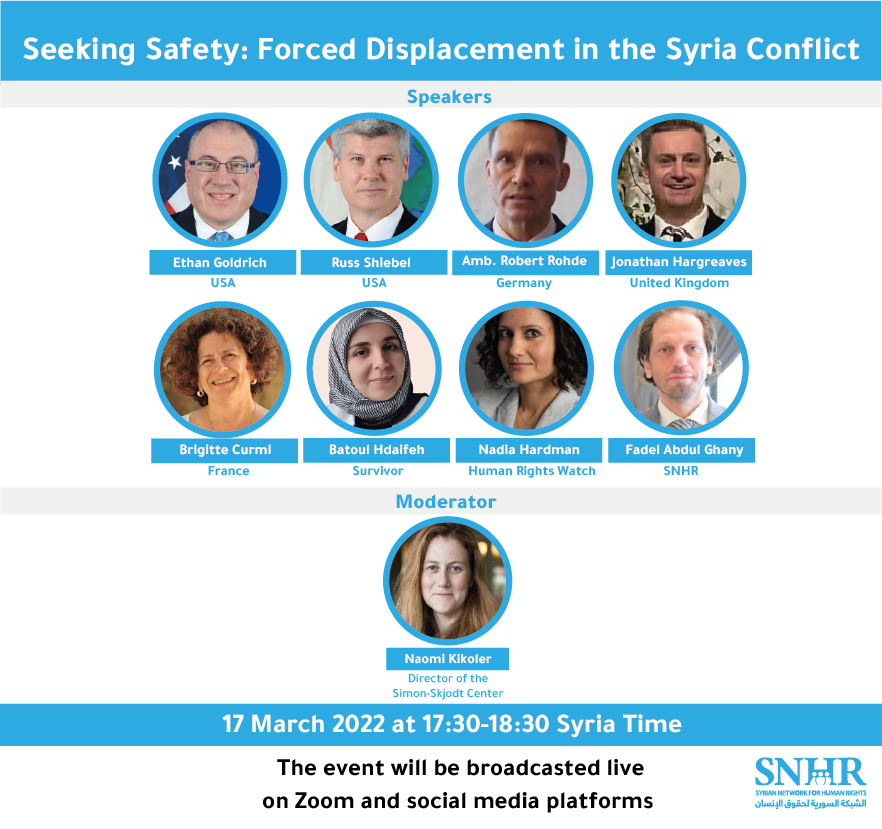Seeking Safety: Forced Displacement in the Syria Conflict

Languages
Available In
March marks the eleventh anniversary of the outbreak of the popular uprising against the Assad regime, when millions of Syrians peacefully rose up to demand freedom, dignity, and a move towards a democratic system that respects and upholds human rights. Protestors’ demands were met with the shelling of civilian areas, the use of chemical weapons and cluster munitions, torture, arbitrary detention, forced displacements, and countless atrocities, some of which have amounted to war crimes and crimes against humanity. The regime and its Russian and Iranian allies have killed at least 207,295 civilians, according to the Syrian Network for Human Rights and have caused massive destruction to vital facilities such as hospitals, schools, markets, water infrastructure, and settlements for internally displaced persons.
The regime and its allies’ brutal and indiscriminate attacks have been one of the main drivers of the displacement of Syrians over the past eleven years – approximately 6.7 million Syrians remain internally displaced, and 6.6 million refugees have sought safety outside of Syria, the largest displacement crisis since World War II. Arbitrary arrest, enforced disappearance, and torture have also contributed to the displacement and flight of Syrians who seek to flee the devastating impact of the war. The Independent International Commission of Inquiry has found that there is reason to believe that pro-regime forces may have committed the crime against humanity of forcible transfer. Most displaced have been forced to move their families in search of safety multiple times since the start of the conflict, and many lack access to basic services, employment opportunities and sustainable housing. Refugees who have fled to Jordan, Turkey, Lebanon, and Iraq also face many challenges – including rising levels of unemployment, food insecurity and increasing social tensions with host communities. And as the conflict persists, many refugees continue to state it’s unlikely that they would be able to safely return to Syria in the near future.
Forced displacements are part of a broader web of abuses and violations that impact millions of Syrians, including the destruction of homes, and the seizure and looting of property. This event will address the displacement of millions of Syrians; the ways in which the international community can assist displaced persons; and the essential link between a political resolution to the conflict and the voluntary, safe, and dignified return of all displaced persons. During the event, we will explore the following questions:
- How can the international community, NGOs, and other entities better support and assist forcibly displaced people, especially vulnerable populations such as women, children, and the elderly?
- How can we secure forcibly displaced persons’ rights to the ownership of their lands and homes following their forcible displacement and the imposition of arbitrary legislation authorizing state control over their lands and homes?
- What are the tools available to hold the Syrian regime and its Russian and Iranian allies accountable for the violations and abuses they have committed? What role can local and international organizations, as well as victims, survivors, and their families play in this context?
- Is a political solution to the conflict, under UNSCR 2254, a pre-requisite for the safe, voluntary, and dignified return of IDPs and refugees?
Speakers:
Ethan Goldrich, Deputy Assistant Secretary, Bureau of Near Eastern Affairs, US Department of State.
Russ Schiebel, Acting Deputy Assistant Secretary for the Bureau of Population, Refugees, and Migration, US Department of State.
Amb. Robert Rohde, Ambassador for the Negotiations on Syria and Head of Division for Syria, Iraq, Lebanon & Anti ISIS Strategy at German Federal Foreign Office
Jonathan Hargreaves the UK Special Representative for Syria
Brigitte Curmi, France Special Envoy for Syria
Batoul Hdaifeh, Survivor of al Bayda Massacre and forcibly displaced.
Nadia Hardman, Researcher, Refugee and Migrant Rights Division, Human Rights Watch.
Fadel Abdul Ghany, director of the Syrian Network for Human Rights (SNHR).
Moderator: Naomi Kikoler, Director of the Simon-Skjodt Center for the Prevention of Genocide at the United States Holocaust Memorial Museum
To participate directly on Zoom, please sign up using the following link:
https://zoom.us/webinar/register/WN_3qbKPipuQMe_teeaZI_7dQ
After registering, you will receive a confirmation email containing information about joining the event.
The event is in English – there will be direct translation to Arabic.
To watch the live broadcast on social media platforms:
SNHR Twitter
SNHR Facebook
SNHR Youtube
SNHR clubhouse
SNHR Telegram
For any additional information, please contact Mr. Abdullah Bassam
([email protected]).


